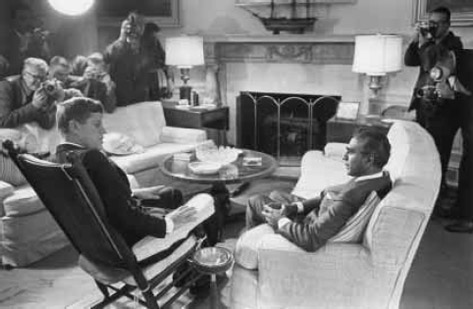British Guiana 1961-63

Cheddi Jagan, chief minister of British Guiana, meets U.S. president John Kennedy
We saw in chapter three of the book that the U.S. was greatly worried about the prime minister of the colony of British Guiana, Cheddi Jagan, whom it saw as a communist and as apt, once independence was achieved, to align with Cuba and the Soviet Union . The problem for Washington was that the British did not share this concern, seeing Jagan as relatively harmless. In response, Kennedy seems to have authorized contacts, through the CIA and U.S. trade unions, with some of Jagan's labor opponents. This resulted in a general strike and riots; the British had to send in troops from Jamaica ; and Kennedy's Secretary of State, Dean Rusk, then pressed the U.K. to schedule new elections on the grounds of the “disorders.” The British, suspecting the CIA's hand, began to give ground and proposed postponing independence for some months. In the meantime, the U.S. started a covert operation intended to influence future elections, all the while maintaining its labor efforts. A second, racially polarized, general strike then broke out, much larger and more violent than the first, and this, plus a refusal of U.S. economic aid, lost Jagan just enough support so that, if the electoral laws were changed, he might be voted out of office in the next elections. The British seized this opportunity, responding to Kennedy's saber-rattling (“adding British Guiana to Cuba ” would lead to pressures to “take military action against Cuba ”) by announcing that they would switch Guiana to a proportional representation electoral system. A year and one more general strike later, along with lavish CIA help to the opposition, and Jagan's party was duly voted out of office. In effect, with reference to other node 15 cases (proxy forces and psychological warfare), the British were cast in the role of the Guatemalan army and the Haitian police. 1
1) Rusk quote on “disorders” in letter to Home, transmitted 19 February 1962 as State to Embassy in U.K. ; Kennedy in meeting with British, 30 June 1963; both FRUS 1961-1963 , vol. 12: docs. 264, 295; also docs. 249-51, 253, 258, 263, 267 (second attachment), 272-3, 276, 278, 280-1; FRUS 1964-1968 , vol. 32: docs. 370, 371 (attachment), 373; “Kennedy Refuses Aid to Guiana; Ties to Reds Termed Reason”; “C.I.A. Men Aided Strikes in Guiana Against Dr. Jagan”; “A Kennedy-C.I.A. Plot Returns to Haunt Clinton”; all New York Times , 9 July 1963; 22 February 1967; 30 October 1994; Waters and Daniels (2005: 289, 302, 305).
